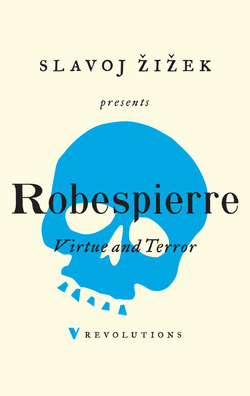Virtue and Terror

Реклама. ООО «ЛитРес», ИНН: 7719571260.
Оглавление
Robespierre Maximilien. Virtue and Terror
VIRTUE. AND TERROR
MAXIMILIEN ROBESPIERRE
CONTENTS
INTRODUCTION. ROBESPIERRE, OR, THE ‘DIVINE VIOLENCE’ OF TERROR. Slavoj Žižek
SUGGESTED FURTHER READING
GLOSSARY
CHRONOLOGY
TRANSLATOR’S NOTE
Part One. ROBESPIERRE AT THE CONSTITUENT ASSEMBLY AND THE JACOBIN CLUB
1. ON VOTING RIGHTS FOR ACTORS AND JEWS. 23 December 17891
2. ON THE SILVER MARK. April 17911
3. ON THE CONDITION OF FREE MEN OF COLOUR. 13 May 17911
4. ON THE RIGHTS OF SOCIETIES AND CLUBS. 29 September 17911
5. EXTRACTS FROM ‘ON THE WAR’ 2 January 17921
Part Two. IN THE NATIONAL CONVENTION
6. EXTRACTS FROM ‘ANSWER TO LOUVET’S ACCUSATION’ 5 November 17921
7. EXTRACTS FROM ‘ON SUBSISTENCE’ 2 December 17921
8. ON THE TRIAL OF THE KING. 3 December 17921
9. DRAFT DECLARATION OF THE RIGHTS OF MAN AND OF THE CITIZEN. 24 April 17931
10. EXTRACTS FROM ‘IN DEFENCE OF THE COMMITTEE OF PUBLIC SAFETY AND AGAINST BRIEZ’ 25 September 17931
11. EXTRACTS FROM ‘REPORT ON THE POLITICAL SITUATION OF THE REPUBLIC’ (18 November 1793/27 Brumaire Year II)1
12. RESPONSE OF THE NATIONAL CONVENTION TO THE MANIFESTOS OF THE KINGS ALLIED AGAINST THE REPUBLIC. 5 December 1793/15 Frimaire Year II1
13. ON THE PRINCIPLES OF REVOLUTIONARY GOVERNMENT. 25 December 1793/5 Nivôse Year II1
14. ON THE PRINCIPLES OF POLITICAL MORALITY THAT SHOULD GUIDE THE NATIONAL CONVENTION IN THE DOMESTIC ADMINISTRATION OF THE REPUBLIC. 5 February 1794/18 Pluviôse Year II1
15. EXTRACTS FROM SPEECH OF 8 THERMIDOR YEAR II. 26 July 1794/8 Thermidor Year II1
NOTES
Отрывок из книги
A series of classic texts by revolutionaries in both thought and deed.
Each book includes an introduction by a major contemporary writer
.....
The problem here is not terror as such – our task today is precisely to reinvent emancipatory terror. The problem lies elsewhere: egalitarian political ‘extremism’ or ‘excessive radicalism’ should always be read as a phenomenon of ideologico-political displacement: as an index of its opposite, of a limitation, of a refusal effectively to ‘go all the way’. What was the Jacobins’ recourse to radical ‘terror’ if not a kind of hysterical acting out bearing witness to their inability to disturb the very fundamentals of economic order (private property, etc.)? And does the same not go even for the so-called ‘excesses’ of Political Correctness? Do they also not display the retreat from disturbing the effective (economic etc.) causes of racism and sexism? Perhaps, then, the time has come to render problematic the standard topos, shared by practically all the ‘postmodern’ Leftists, according to which political ‘totalitarianism’ somehow results from the predominance of material production and technology over intersubjective communication and/or symbolic practice, as if the root of the political terror resides in the fact that the ‘principle’ of instrumental reason, of the technological exploitation of nature, is extended also to society, so that people are treated as raw material to be transformed into a New Man. What if it is the exact opposite which holds? What if political ‘terror’ signals precisely that the sphere of (material) production is denied its autonomy and subordinated to political logic? Is it not that all forms of political ‘terror’, from the Jacobins to the Maoist Cultural Revolution, presuppose the foreclosure of the sphere of production proper, its reduction to the terrain of political battle? In other words, what it effectively amounts to is nothing less than the abandonment of Marx’s key insight that the political struggle is a spectacle which, in order to be deciphered, has to be referred to the sphere of economics (‘if Marxism had any analytical value for political theory, was it not in the insistence that the problem of freedom was contained in the social relations implicitly declared ‘‘unpolitical’’ – that is, naturalized – in liberal discourse’26).
As to philosophical roots of this limitation of egalitarian terror, it is relatively easy to discern the roots of what went wrong with Jacobin terror as lying in Rousseau who was ready to pursue to its ‘Stalinist’ extreme the paradox of the general will:
.....